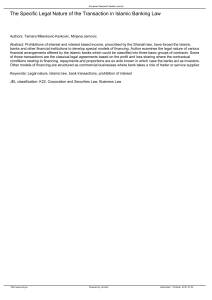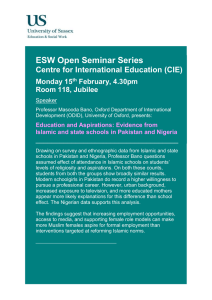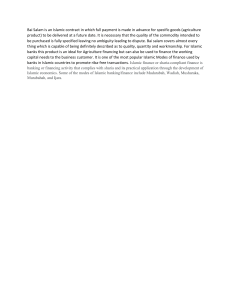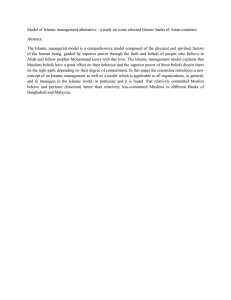Chapter 1 - Assessing the determinants of profitability of IBs in Nigeria
advertisement
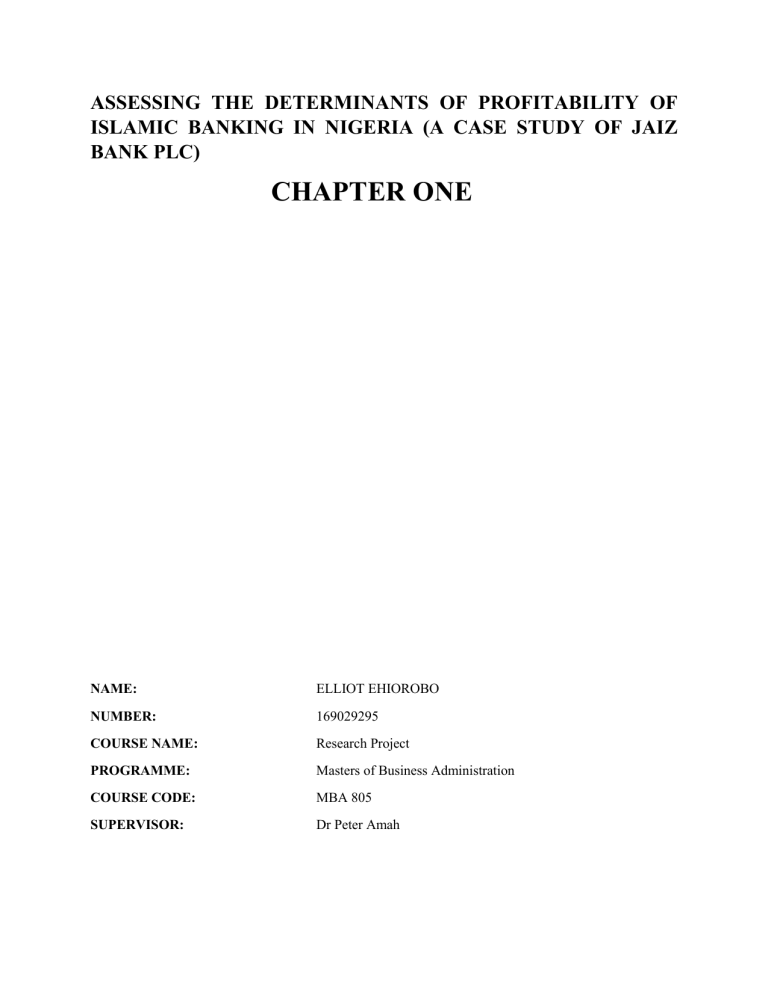
ASSESSING THE DETERMINANTS OF PROFITABILITY OF ISLAMIC BANKING IN NIGERIA (A CASE STUDY OF JAIZ BANK PLC) CHAPTER ONE NAME: ELLIOT EHIOROBO NUMBER: 169029295 COURSE NAME: Research Project PROGRAMME: Masters of Business Administration COURSE CODE: MBA 805 SUPERVISOR: Dr Peter Amah INTRODUCTION 1.1 Background to the study Organisations across the world are finding new ways to remain competitive, accessing untapped markets in order to sustain their profits and relevance (PwC, 2017). Consumer segments are seen to be divided across income classes, social and even religious dimensions. Banks as such are developing new products and services to meet these unique and different consumer segments, identify their preferences and keep them satisfied. A key consumer segment that has shown slight apathy to modern day conventional banking are the Muslims, or those who practise Islam as a religion. Islamic ideology, teachings and ideology dictates forbid this consumer segment from consuming interest otherwise known as riba while also negating investments into “islamically prohibited businesses” such as gambling, alcohol business, futures tradings amongst others. Interest refers to amount on all loans of money or paid on depositors funds used for loans by commercial banks (Raza, Hena & Saeed, 2017). In response, this has led to the proliferation of new Islamic banks (banks that practise based on Islamic law) across the world and even in Nigeria. In a similar fashion, the conventional banks are also evolving products that meet the interest of the Muslim population and Islamic fundamentalists to tap into these markets. Islamic banking, also known as non-interest banking, is a banking system that is based on the principles of Islamic, or Shari'ah, law and guided by Islamic economics. Two fundamental principles of Islamic banking are the sharing of profit and loss and the prohibition of the collection and payment of interest by lenders and investors. Islamic law prohibits riba or usury. defined as interest paid on all loans of money (although some Muslims dispute whether there is a consensus that interest is equivalent to riba) (Farooq, 2005). These prohibitions have been applied historically in varying degrees in Muslim countries/communities to prevent un-Islamic practices. In the late 20th century, as part of the revival of Islamic identity, a number of Islamic banks formed to apply these principles to private or semi-private commercial institutions within the Muslim community (Usmani, 1998). Their number and size has grown, so that by 2009, there were over 300 banks and 250 mutual funds around the world complying with Islamic principles, and around $2 trillion was sharia-compliant by 2014. Sharia-compliant financial institutions represented approximately 1% of total world assets, concentrated in the Gulf Cooperation Council (GCC) countries, Iran, and Malaysia (Mohammed, 2014). The steady expansion of Islamic banks has been the hallmark of the Muslim world financial landscape. With a network that spans more than 50 countries, Islamic banks are now playing an increasingly significant role in their respective economies. Based on their charters, Islamic banks have the flexibility of becoming shareholders and creditors of firms, as well as the advantage of providing investment-banking services. In this respect, Islamic banks are rapidly gaining market shares in their domestic economies. In retrospect, the presence of Islamic banks exemplifies the empirical success and the viability of eliminating fixed interest payments from financial transactions (Yueh, 2014). Nigeria’s first licensed Islamic bank, Jaiz Bank Plc commenced full operation of its non-interest commercial banking in Nigeria in 2012 and its currently the only bank in Nigeria that solely operates non-interest commercial banking. The introduction of islamic banking is part of a drive by the Central Bank of Nigeria, CBN, to propel Nigeria’s economy and promote financial inclusion by introducing alternative products. The non-interest regime offers veritable incentives and attractive options for investors (Kareem, Raheem, 2011). The Islamic bank in Nigeria performs the same financial intermediation as conventional banks. It is a deposit-institution whose scope of activities includes all currently known banking activities except borrowing and lending on the basis of interest (riba) (Kareem, Raheem, 2011). The banking does not involve in all forms of Maisai or gharar (speculative ventures like gambling, derivatives) nor any activities that is against the teachings found in the Quran or Hadith. Islamic banking services include profit sharing investments, safe keeping, leasing, cost-plus financing and joint venture agreements. The bank’s philosophy is to deliver world-class sharia-compliant financial services to its clientele irrespective of class, creed, race or religious belief and to contribute to the socio-economic development of the society. Profit and loss sharing modes — musharakah and mudarabah — where financier and the user of finance share profits and losses, are based on "contracts of partnership (Jamaldeen, 2012). These have been called the "real and ideal" modes of Islamic finance (as Islam calls for sharing of rewards and losses by all who contribute capital to a commercial enterprise, according to Taqi Usmani (1998). The variance in the business model of Islamic banks and that of conventional banks has led the researcher to investigate the determinants of profitability of these banks. 1.2 Statement of Problem Every country has financial institutions to embody the financial guidelines and ensure the economic growth as well as, control of money for the country. The financial institutions are responsible to manage and control all the resources related to financing. The presence of banking institution is to help the growth of economic activity in a country (Samail, Zaidi, Mohammed, Kamaruzaman, 2018). In Nigeria there are four types of banks that are privately owned, namely commercial banks, merchant banks, micro-finance banks and Islamic bank. Conventional banks make substantial portion of its profit from interest charged on credit facilities as well as fees for providing various services to its customers. Islamic banks in general are forbidden from charging interest on funds lent out. The performance of the financial system has big influences on the growth of Islamic banking. According to previous study, financial performance plays an important role in the economic in the whole country (Blejer, 2006). Thus, in this research we will determine the variables that will affect the financial performance in Islamic Banking in Nigeria. In order for the banks to continue to provide these services as stated above, it needs to make adequate profit and return on its assets. However, there has been little knowledge in qualitative terms on how Islamic banks make profit and similarly there is a scarcity of literature that profiles the various Islamic products and services in terms of their investment and sales potential. According to Hassan & Bashir (2003), the issues of viability of Islamic banks and their ability to mobilize saving, pool risks and facilitate transactions did not get enough coverage in the existing literature. Islamic banking places emphasis on asset-based lending and hence would contribute to the development of the real sector of the economy. However Islamic banking is a new development in Nigeria, there is currently just one bank (Jaiz Bank Plc) which began operations in 2012. Hence, there is a need to ascertain which products /services are more readily acceptable in the Nigerian market and what the intrinsic strengths and weaknesses of these products contribution to profits. A broad knowledge of these scenarios will assist in assessing the profitability of Islamic banking in Nigeria. Furthermore, investigations into the profitability of Islamic banks are rarely explored for developing economies like Nigeria, hence this work intends to bridge this gap. The following are financial activities performed by the Islamic bank in Nigeria; Murabaha transactions, Ijara transactions, Mudaraba transactions, Musharakah, and investment in Sukuk. This study would conduct a research into the relationship between the variables and the profitability of the bank. 1.3 Objective of the Study The primary objective of the study is to examine the determinants of profitability of Islamic banking in Nigeria. The specific objectives are: i. To determine the impact of Murabaha transactions on the profitability of Islamic banking in Nigeria. ii. To determine the impact of Ijara transactions on the profitability of Islamic banking in Nigeria. iii. To determine the impact of Mudaraba transactions on the profitability of Islamic banking in Nigeria. iv. To determine the impact of Musharakah on the profitability of Islamic banking in Nigeria. v. To determine the impact of Investment in Sukuk on the profitability of Islamic banking in Nigeria. 1.4 Research Questions i. Is there a significant relationship between Murabaha transactions and profitability of Islamic Banking in Nigeria? ii. Is there a significant relationship between Ijara transactions and profitability of Islamic Banking in Nigeria? iii. Is there a significant relationship between Mudaraba transactions and profitability of Islamic Banking in Nigeria? iv. Is there a significant relationship between Musharakah and profitability of Islamic Banking in Nigeria? v. Is there a significant relationship between Investment in Sukuk and profitability of Islamic Banking in Nigeria? 1.5 Research Hypotheses The hypotheses of the study are stated in NULL FORM as follows: Hypothesis One Ho: That there is no significant relationship between Murabaha transactions and profitability of Islamic Banking in Nigeria. Hypothesis Two Ho: That there is no significant relationship between Ijara transactions and profitability of Islamic Banking in Nigeria. Hypothesis Three Ho: That there is no significant relationship between Mudaraba transactions and profitability of Islamic Banking in Nigeria. Hypothesis Four Ho: That there is no significant relationship between Musharakah and profitability of Islamic Banking in Nigeria. Hypothesis Five Ho: That there is no significant relationship between Investment in Sukuk and profitability of Islamic Banking in Nigeria. 1.6 Scope of the Study The main purpose of this study is to establish the factors that influence the profitability of the Islamic bank in Nigeria. The study is delimited to one Islamic bank in Nigeria (Jaiz Bank Plc.) Jaiz Bank is the only operational Islamic bank in Nigeria. Data is collected from financial statements of the bank from 2013 to 2018 financial years. 1.7 Significance of study This study is of importance to researchers, shareholders, management, economists and business analysts as it looks into the financial activities of Islamic bank and determines how profitable these activities are. Hence the significance of the study cannot be over-emphasized. Thus, the significance of this study is itemized as follow: i. The findings of this study will guide shareholders on the various factors that drive the bank’s profitability. ii. The findings will be of immense help to management as it would determine key factors responsible for the bank’s profit and hence aid decision making. iii. The finding will also assist economist in determining the relevance of Islamic banking on the economy as whole and if more of these banks should be encouraged. iv. The study will be very useful to academia and intellectuals thus adding to their body of knowledge. 1.8 Outline of the Study This research work will be divided into five chapters. The first chapter will be introduction. Chapter two will focus on the literature review and theoretical framework of the determinants of profitability of Islamic banking in Nigeria. The third Chapter will be based on the methodology stating the research and sample design and the sampling method to be used. Chapter four would comprise the interpretation and analysis of the result obtained. While the final chapter, which is chapter five, comprises the summary of findings, conclusion, and recommendation. References 1. Blejer, M. I. (2006). Economic growth and the stability and efficiency of the financial sector. Journal of Banking & Finance, 30(12), 3429-3432. 2. Farooq, Mohammad Omar (2005). Riba-Interest Equation and Islam: Re-examination of the Traditional Arguments. SSRN 1579324 (https://ssrn.com/abstract=1579324). 3. Hassan, M. K., & Bashir, A. H. M. (2003). Determinants of Islamic banking profitability. In 10th ERF annual conference, Morocco (Vol. 7, pp. 2-31). 4. Jamaldeen, Faleel (2012). Islamic Finance for Dummies. (http://www.dummies.com/how-to/content/islamic-finance-for-dummiescheatsheet.html). Retrieved 24 July 2016. 5. Kareem, R.O and Raheem, K.A. (2011). Islamic Banking and Global Financial Crises. A paper presented at International Conference on Global Financial Crisis: Islamic Banking as a Credible Alternative System.Crescent University Press. PP.371-391. 6. Kettell, Brian (2011). Introduction to Islamic Banking and Finance (https://books.google.com/? id=lVRXLZVOz3MC&pg=PA155&lpg=PA155&dq=salam+cannot+be+gold+silver# v=onepage&q=salam%20cannot%20be%20gold%20silver&f=false). Retrieved 9 May 2019. 7. Mohammed, Amin (2015) "A Simple Introduction to Islamic Mortgages" (http://www.mohammedamin.com/Islamic_finance/Simple-introduction-toIslamicmortgages.html). Retrieved 14 May 2019. 8. Mohammed, Naveed (2014). The Size of the Islamic Finance Market. (http://www.islamicfinance.com/2014/12/size-islamic-finance-market-vsconventionalfinance/). Islamic Finance. 9. SAMAIL, Nur Amirah Binti, ZAIDI, Nurul Syuhada Binti, MOHAMED, Ahmad Syubaili b, KAMARUZAMAN, Mohd Naim bin (2018). Determinants of Financial Performance of Islamic Banking in Malaysia, International Journal of Academic Research in Accounting, Finance and Management Sciences 8 (4): 21-29. 10. Usmani, Taqi (1998). An Introduction to Islamic Finance. (https://web.archive.org/web/20150807040308/http://apsk.kz/en/images/economics/A n%20Introduction%20to%20Islamic%20Finance.pdf) (PDF). Kazakhstan. Archived from the original (http://apsk.kz/en/images/economics/An%20Introduction%20to%20Islamic%20Finan ce.pdf) (PDF) on 7 August 2015. Retrieved 2 October 2017. 11. Yueh, Linda (18 July 2014). Islamic banking: Growing fast but can it be more than a niche market? (https://www.bbc.com/news/business-28365639). Retrieved 14 April 2015. BBC News.

